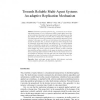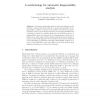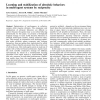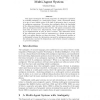122
click to vote
CDC
2010
IEEE
14 years 9 months ago
2010
IEEE
Abstract-- It is desirable to limit the amount of communication and computation generated by each agent in a large multi-agent system. Event- and self-triggered control strategies ...
138
click to vote
CCIA
2010
Springer
14 years 9 months ago
2010
Springer
Interactions within Multi-agent systems can be structured in different ways depending on the application scenario and its environmental restrictions. In previous work we have devel...
126
click to vote
IGPL
2010
14 years 11 months ago
2010
Multi-agent systems where the agents are developed by parties with competing interests, and where there is no access to an agent's internal state, are often classified as `ope...
214
click to vote
IAT
2010
IEEE
14 years 11 months ago
2010
IEEE
Abstract--This article deals with the issue of concept learning and tries to have a game theoretic view over the process of cooperative concept learning among agents in a multi-age...
122
click to vote
IDC
2009
Springer
14 years 11 months ago
2009
Springer
Emergence is a key element in the research of multi-agent systems. Emergent properties provide higher level features to a system formed of simpler individuals. So far, emergence ha...
126
click to vote
MAGS
2010
15 years 15 days ago
2010
Abstract. Distributed cooperative applications (e.g., e-commerce) are now increasingly being designed as a set of autonomous entities, named agents, which interact and coordinate (...
156
click to vote
ICFEM
2010
Springer
15 years 18 days ago
2010
Springer
We present an algorithm based on temporal-epistemic model checking combined with fault injection to analyse automatically the diagnosability of faults by agents in the system. We d...
130
click to vote
SAC
2002
ACM
15 years 1 months ago
2002
ACM
Designing realistic multi-agent systems is a complex process, which involves specifying not only the functionality of individual agents, but also the authority relationships and l...
110
click to vote
BC
1998
15 years 1 months ago
1998
Optimization of performance in collective systems often requires altruism. The emergence and stabilization of altruistic behaviors are dicult to achieve because the agents incur ...
100
click to vote
CORR
2000
Springer
15 years 1 months ago
2000
Springer
Appeared in: Dekker (Ed.) Proceedings of the 12th Amsterdam Colloquium (AC'99). Institute for Logic, Language and Computation, 1999, pages 43




